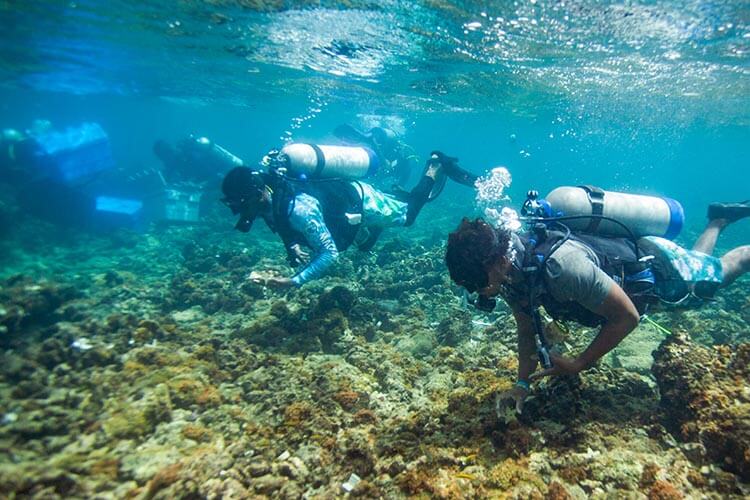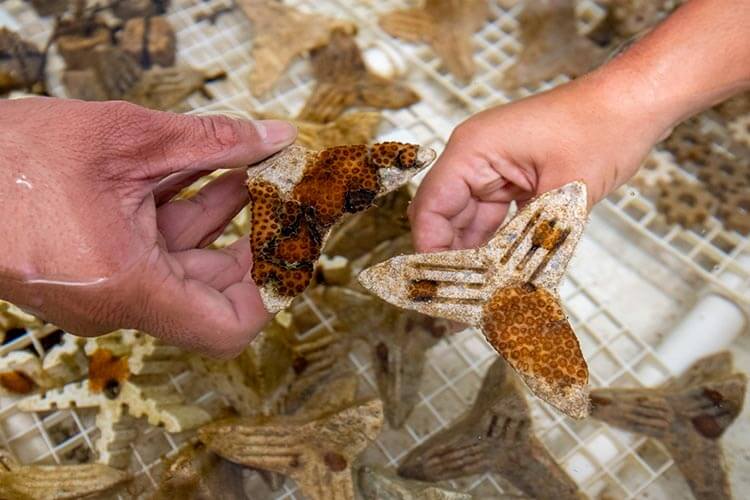
By DIVE Staff
The Reef Renewal Foundation Bonaire (RRFB) has announced a new partnership with Fundación Dominicana de Estudios Marinos (FUNDEMAR) and SECORE International, with the three coral restoration organisations combining forces with a new coral breeding project
An outline of the new initiative describes the partnership as ‘a new project that aims to foster the application and cost-effectiveness of novel coral breeding technologies at key stages of Coral Seeding methodology: collecting coral spawn and assisted fertilization, mass coral larvae rearing, coral settlement, and improving survival of corals after seeding them on the reef.’
Caribbean coral reefs have been struggling with a series of mass bleaching events – eight across the wider region including the Gulf of Mexico and Florida since 1987. Large-scale die-offs caused by the spread of Stony Coral Tissue Loss Disease (SCTLD) have also left some reefs severely depleted of coral cover.
Coastal communities that depend on healthy reefs are suffering mounting economic losses as a result – both in terms of income and coastal protection – which has led to a rise in coral restoration projects which not only aim to replace the dead coral, but improve its future resilience by increasing the genetic diversity of threatened populations.
Related articles

Coral seeding, as it is known, is a process by which the reproductive gametes spread by reef-building corals are collected during mass spawning events and subsequently bred in a lab. Re-seeding the reefs with the newly formed larvae promotes genetic diversity through the introduction of large numbers of entirely unique coral offspring to the reefs.
The new 3-year project has been awarded funding of US$1.38 million from the Coral Research & Development Accelerator Platform (CORDAP), a UN grant program designed to fast-track the research and development of coral reef recovery initiatives worldwide
New research and development innovations planned by the partnership include multi-colony spawning collectors for underwater coral nurseries and outplanting sites on the reef, as well as novel substrates – the material in which coral fragments are grown – to facilitate bulk outplanting.
Existing technologies will be scaled up through the use of Coral Rearing In-situ Basins – aka CRIBs – floating devices for culturing coral larvae on the reef, without having to transport it to and from a land-based lab. Newborn coral offspring will also be fed after they are settled, to give them a headstart and a better rate of survival once outplanted on the reef, and new methods of settling coral larvae directly on the reef floor will be piloted.

The project will also see FUNDEMAR’s land-based coral larvae rearing facility in the Dominican Republic expanded to double its current capacity, and a new facility will be designed for RRFB in Bonaire, allowing more coral offspring to be reared in a controlled setting before outplanting. The new facilities will also serve as educational and research and development centres.
‘As the Caribbean faces increasingly challenging ocean conditions, harnessing the latest technologies for large-scale coral breeding takes on an ever more crucial role in assisting the recovery of endangered coral populations, said Francesca Virdis, COO of RRFB. ‘As restoration-focused organizations, it’s important to unite strengths to amplify our efforts and promote the restoration of stronger, more resilient coral reefs.’
The CORDAP funding will enable the three organizations to focus not only on the technical strategies of coral seeding, but also on sharing knowledge and resources through other Caribbean locations.
‘Coral reefs are in a critical period, where threats seem to never end,’ said Rita Sellares, CEO of FUNDEMAR. ‘CORDAP offers a unique financing platform, encouraging coordinated cooperation projects and generating strategic alliances between experts, communities and countries to achieve their survival with haste.’


